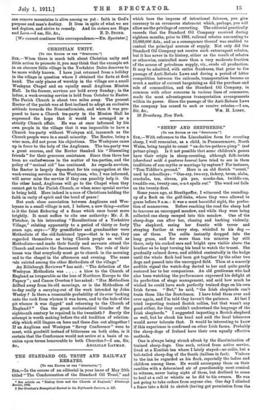THE STANDARD OIL TRUST AND RAILWAY REBATES.
[TO THE EDITOR OF THE " SPECTATOR."]
Stn,—In the course of an editorial in your issue of May 20th titled " The Condemnation of the Standard Oil Trust," and
• See article on "Bishop Gore and the Church of England," Edinburgh Review, 1908. t See Overton's Evangelical Eeviva/ in the Eighteenth Century. P. 157.
which bore the impress of intentional fairness, you give currency to an erroneous statement which, perhaps, you will allow me the privilege of correcting. The editorial practically records that the Standard Oil Company received during eighteen months, prior to 1881, railroad rebates amounting to 10,000,000 dols., and as a consequence thereof was enabled to control the principal sources of supply. Not only did the Standard Oil Company not receive such extravagant rebates, but it has never in its history, either as the result of rebates or otherwise, controlled more than a very moderate fraction of the source of petroleum supply, viz., crude oil production. It may be admitted, with entire frankness, that prior to the passage of Anti-Rebate Laws and during a period of bitter competition between the railroads, transportation became as much a matter of current bargaining as did the purchase and sale of commodities, and the Standard Oil Company, in common with other concerns in various lines of commerce, made the most advantageous transportation arrangements within its power. Since the passage of the Anti-Rebate Laws the company has ceased to seek or receive rebates.—I am,














































 Previous page
Previous page